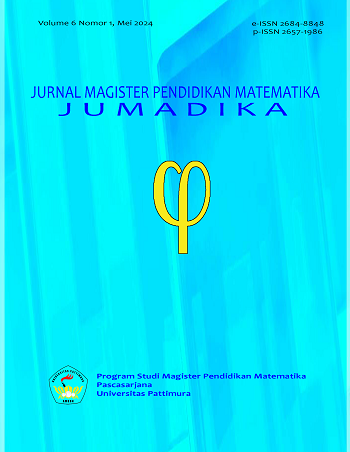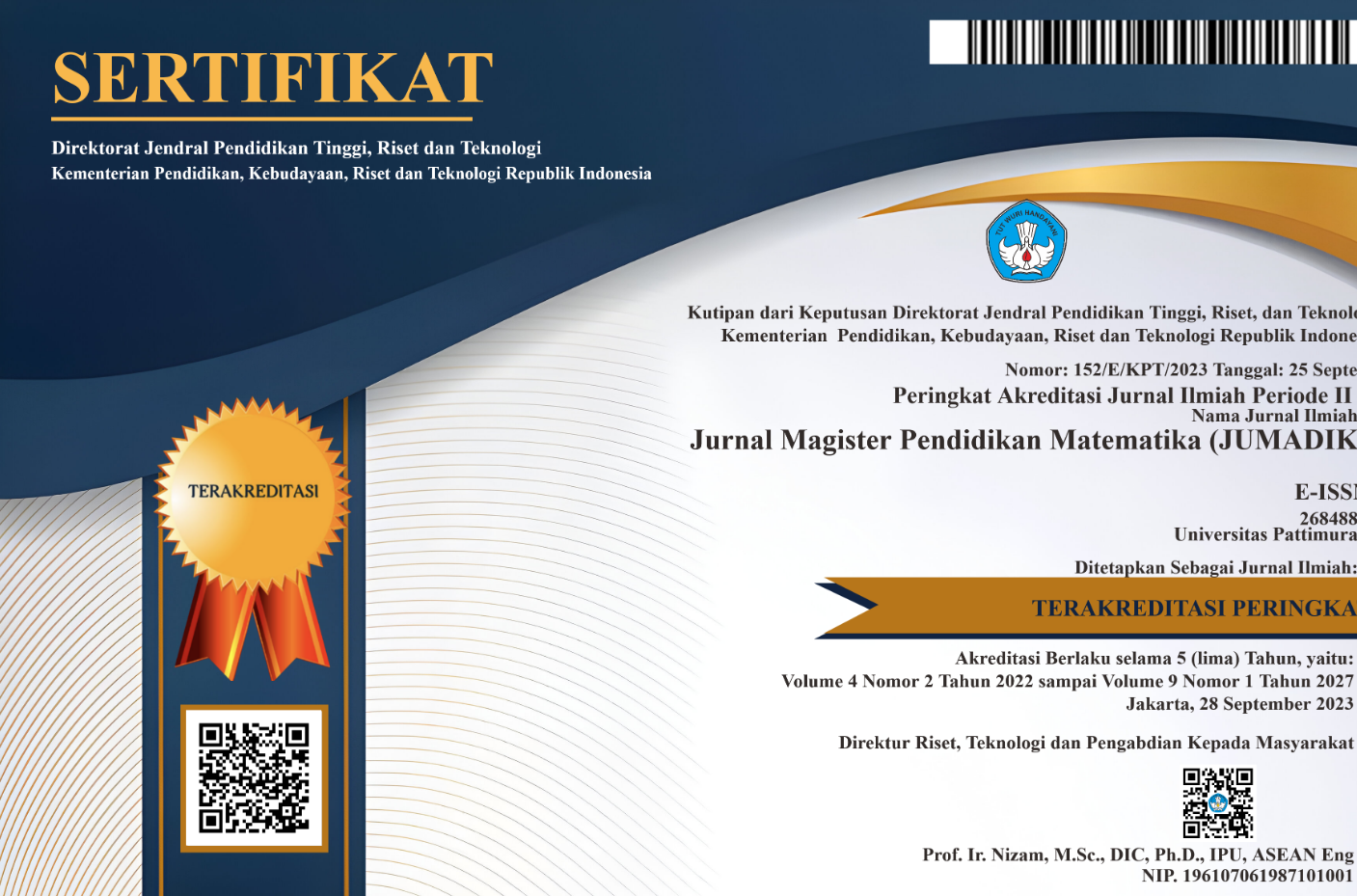KARAKTERISTIK DOSEN IDEAL BERDASARKAN PERSEPSI CALON GURU MATEMATIKA
Abstract
This research was conducted to obtain lecturer profiles according to student perceptions. The attributes used in this research are discipline, authority, learning methods, material delivery, assignments, material review, remedial, and assessment which will then be analyzed using conjoint analysis. The conjoint analysis process with the help of SPSS 20 produces 16 attribute combinations which will then be distributed to students in the form of a questionnaire for assessment. Based on student assessments, the combination of attribute levels that has the highest preference value is lecturers who are disciplined in arriving on time, authoritative as individual lecturers, using conventional learning methods, delivering material using pure mathematics, lecturers who give assignments after being checked and then return them, carry out reviewing material before the exam, lecturers who carry out remediation, and also lecturers who provide objective assessments. The results of the conjoint analysis show that the attribute that has the highest relative importance value is reviewing the material with the attribute level that has the highest usefulness value, namely the lecturer reviewing the material before the exam. Next, successively based on the importance of the attributes, namely the attributes of discipline, tasks, remedial, authority, assessment, learning methods and delivery of material. Characteristics of lecturers in the Mathematics Education Department that students like are lecturers who, in the learning process, always review the material before taking exams; arrive on time for lectures; when giving assignments it is corrected, graded and then returned to the student; conducting re-exams for students who have not completed them or wish to improve their grades; and of course a lecturer must have authority as a lecturer; then in carrying out the assessment, the lecturer gives an assessment to the student objectively without considering the closeness of the lecturer to the student or other factors that influence the lecturer's assessment of the student; students prefer lecturers who teach without having to use techniques according to the lecturer's professionalism, the important thing is that the material presented can be understood by students; as well as delivering material using pure mathematics which can deepen students' mathematical knowledge
Downloads
References
Bimo, W. A. (2016). Hubungan Motivasi Kerja dan Disiplin Kerja Dosen dengan Prestasi Belajar Mahasiswa Di Universitas IBN Khaldun Bogor. Jurnal Keuangan Dan Perbankan, 11(1), 5–15.
Haddar, G. Al, Kuswandi, S., Silitonga, D. O. S. B. N., Iwan, Nur’aini, I. I. P. K. D., Gaspersz, N. S. S., & Yurfia. (2023). Pengantar Microteaching (1st Editio, Vol. 01). Yayasan Kita Menulis.
Hutapea, P., & Thoha, N. (2008). Kompetensi Komunikasi Plus : Teori, Desain, Kasus dan Penerapan untuk HR dan Organisasi yang Dinami. Gramedia Pustaka Utama.
Izzati, N. (2015). Pengaruh Penerapan Program Remedial Dan Pengayaan Melalui Pembelajaran Tutor Sebaya Terhadap Hasil Belajar Matematika Siswa. Eduma : Mathematics Education Learning and Teaching, 4(1). https://doi.org/10.24235/eduma.v4i1.20
Kurniati, N., Baidowi, B., & Hikmah, N. (2018). Persepsi Mahasiswa Pendidikan Matematika Terhadap Kinerja Dosen Dalam Proses Perkuliahan. Jurnal Pijar Mipa, 13(1), 32–36. https://doi.org/10.29303/jpm.v13i1.471
Nur’aini, K. D., & Pagiling, S. L. (2020). Analisis Pedagogical Content Knowledge Guru Matematika Sekolah Menengah Pertama Ditinjau Dari Segi Gender. AKSIOMA: Jurnal Program Studi Pendidikan Matematika, 9(4), 1036. https://doi.org/10.24127/ajpm.v9i4.3171
Nur’aini, K. D., & Ruslau, M. F. . (2019). Mathematics Teacher Performance Based On Student’s Perception and Learning Achievement By Applying Structural Equation Modeling.
Nur’aini, K. D., Ruslau, M. F. V., & Palobo, M. (2019). Mathematics teacher performance based on student’s perception and learning achievement by applying structural equation modeling approach. IOP Conference Series: Earth and Environmental Science, 343(1). https://doi.org/10.1088/1755-1315/343/1/012237
Nur’aini, K. D., & Ruslau, M. F. V. (2020). Kinerja Guru Matematika Berdasarkan Persepsi dan Kompetensi Siswa SMP Di Kota Merauke. Journal of Honai Math, 3(1), 13–26. https://doi.org/10.30862/jhm.v3i1.106
Palobo, M., Pagiling, S. L., & Nur’aini, K. D. (2020). Analysis of Effect of learning Style on Mathematics Learning Outcomes. 473(Icss), 484–488. https://doi.org/10.2991/assehr.k.201014.106
Prayitno. (2009). Dasar Teori dan Praksis Pendidikan. Grasindo.
Saleh, S., & Nasrullah, M. (2019). Pengaruh Disiplin Mengajar Dosen Terhadap Motivasi Belajar Mahasiswa Program Studi Pendidikan Administrasi Perkantoran UNM. Seminar Nasional LP2M UNM, 45–48.
Simamora, B. (2014). Pengaruh Disiplin dan Kompetensi Dosen Terhadap Prestasi Mahasiswa Program Studi Penerbitan. Jurnal Publipreneur, 98–113.
Suprihatiningrum, J. (2016). Guru Profesional: Pedoman Kinerja, Kualifikasi, & Kompetensi Guru. Ar-Ruzz Media.
Warti, R., & Lestari, N. (2017). Preferensi Mahasiswa Terhadap Mata Kuliah Statistika Matematika Menggunakan Analisis Konjoin. Prosiding SI MaNIs (Seminar Nasional Integrasi Matematika Dan Nilai Islami, 414–418.
Yusup, F. (2018). Uji Validitas dan Reabilitas Instrumen Penelitian Kuantitatif. Jurnal Tarbiyah, 17–23. https://doi.org/10.21831/jorpres.v13i1.12884.
Copyright (c) 2024 Lusia Greitha Ernawati, Maria Fransina Veronica Ruslau, Khumaeroh Dwi Nur'aini

This work is licensed under a Creative Commons Attribution-NonCommercial-ShareAlike 4.0 International License.
License and Copyright Agreement
In submitting the manuscript to the journal, the authors certify that:
- They are authorized by their co-authors to enter into these arrangements.
- The work described has not been formally published before, except in the form of an abstract or as part of a published lecture, review, thesis, or overlay journal. Please also carefully read Jurnal Magister Pendidikan Matematika (JUMADIKA) Posting Your Article Policy.
- That it is not under consideration for publication elsewhere,
- That its publication has been approved by all the author(s) and by the responsible authorities – tacitly or explicitly – of the institutes where the work has been carried out.
- They secure the right to reproduce any material that has already been published or copyrighted elsewhere.
- They agree to the following license and copyright agreement.
Copyright
Authors who publish with Jurnal Magister Pendidikan Matematika (JUMADIKA) agree to the following terms:
- Authors retain copyright and grant the journal right of first publication with the work simultaneously licensed under a Creative Commons Attribution-NonCommercial-ShareAlike 4.0 International License (http://creativecommons.org/licenses/by-nc-sa/4.0/) that allows others to share the work with an acknowledgment of the work's authorship and initial publication in this journal.
- Authors are able to enter into separate, additional contractual arrangements for the non-exclusive distribution of the journal's published version of the work (e.g., post it to an institutional repository or publish it in a book), with an acknowledgment of its initial publication in this journal.
- Authors are permitted and encouraged to post their work online (e.g., in institutional repositories or on their website) prior to and during the submission process, as it can lead to productive exchanges, as well as earlier and greater citation of published work.








